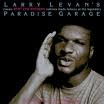Larry Levan was known most notably for telling stories through his sets. There hasn't been a DJ since with that ability...
He was a DJ who spun discs at the New York City night club Paradise Garage. The club has been described as the prototype of the modern dance club, because it was entirely focused on dancing, and was the first to put the DJ at the center of attention. He developed a cult following, who referred to his sets as "Saturday Mass". Levan is credited with introducing the dub aesthetic into dance music. He experimented with drum machines and synthesizers which helped establish new electronic, post-disco sound.
Levan was openly gay and got his start alongside DJ Frankie Knuckles at the Continental Baths, as a replacement for the DJ from The Gallery, Nicky Siano. Levan's DJing style was influenced by Siano's eclectic style, and by The Loft's David Mancuso, who briefly dated Levan in the early 1970s. As Knuckles was still trying to make his way in the New York club scene, Levan became a popular attraction perhaps due to his "diva persona", which he developed in the city's notoriously competitive black drag "houses".
At the height of the disco boom in 1977, Levan was offered a residency at the Paradise Garage. Although owner Michael Brody, who employed Levan at the defunct Reade Street, intended to create a downtown facsimile of Studio 54 catering to an upscale white gay clientele, Levan initially drew an improbable mix of streetwise blacks, Latinos, and punks.
Open only to a select membership and housed in an otherwise unadorned building on King Street in Greenwich Village, the club and Levan's DJing slowly engendered themselves into the mainstream. The DJ and programming director from WBLS, Frankie Crocker often mentioned the club on air and based his playlists around Levan's sets. The PA system of the club included custom-designed "Levan speakers".
Levan became a prolific producer and mixer in the late 1970s and early 1980s, with many of his efforts crossing over onto the national dance music charts. Among the records that received Levan's touch were his remixes of "Ain't Nothin' Goin On But The Rent" by Gwen Guthrie and "Heartbeat" by Taana Gardner, as well as his production work on "Don't Make Me Wait" by the Peech Boys, a group that Levan formed and was part of (and who became the New York Citi Peech Boys when the Beach Boys threatened a lawsuit due to the similar sound of the name). With a strong gospel tinge in the vocal arrangements and driven by a tinkling piano, the latter song is a quintessential example of the deejay's soulful aesthetic. One of the first dance releases to incorporate a dub influence and an appended vocal-only edit, Levan tinkered with the song for nearly a year to the consternation of Mel Charen, whose label, West End Records, was nearing bankruptcy. When it was finally released, much of the song's momentum had been lost and it stalled in the lower reaches of the charts.
As the popularity of the Garage soared in the mid-1980s just as many of his longtime friends lost their battles with AIDS, Levan became increasingly dependent upon PCP and heroin. While performing, he began to ensconce himself within a protective entourage of drag queens and younger acolytes.
The Garage ended its run with a 48 hour-long party in September 1987, weeks before Brody died from AIDS-related complications. The closure devastated Levan, who knew that few club owners would tolerate his quirks and drug dependencies. Although Brody had verbally bequeathed the club's sound and lighting systems to Levan, they were instead left to Brody's mother in his will. This change was reportedly instigated by the late impresario's lover and manager, who reportedly despised Levan.
Despite protestations and pleas to the Brody family from Mel Cheren, the systems remained in storage as their property. Unable to secure a long-term residency after a stay at the short-lived Choice in the East Village, alongside DJ/Proprietor Richard Vasquez and Joey Llanos, Levan began to sell his valuable records for drug money. Friends like Danny Krivit would buy them back for him out of sympathy.
As the nineties dawned, Levan was on the brink of a comeback. In 1991, he designed the sound system for London's Ministry of Sound nightclub and DJed alongside Knuckles in its opening weeks. Although he was still dependent on heroin, Levan's 1992 tour of Japan garnered gushing accolades in the local press. Encouraged by Cheren, he entered rehab and made a tentative return to the studio. On the contrary, he informed his mother in June 1992 that he had "lived a good life" and was "ready to die".
Shortly after returning home from Japan, Levan voluntarily entered the hospital. He died four days later of heart failure caused by endocarditis. In September 2004, Levan was inducted into the Dance Music Hall of Fame for his outstanding achievement as a DJ.
Source: Wikipedia
Follow me on Twitter: @therealcstewart



No comments:
Post a Comment